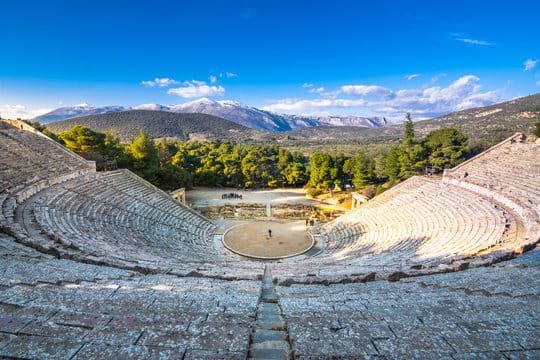EPIDAURUS
Epidaurus (Epidavros) is one of Greece’s most important archaeological sites, renowned for its ancient theater, historical significance, and serene natural setting. Located in the northeastern Peloponnese, Epidaurus was a major religious and cultural center in antiquity, dedicated to healing and the arts.

Here’s why a tourist should visit Epidaurus:
1. The Ancient Theater of Epidaurus:
The highlight of Epidaurus is its ancient theater, a masterpiece of classical Greek architecture. Built in the 4th century BCE, it is celebrated for its perfect acoustics, which allow even the faintest sound, such as a whisper or a dropped coin, to be heard clearly in the uppermost seats. The theater could accommodate up to 14,000 spectators and still hosts performances during the annual Epidaurus Festival, offering visitors a chance to experience ancient drama in its original setting.
2. The Sanctuary of Asclepius:
Epidaurus was famous as a healing center dedicated to Asclepius, the Greek god of medicine. The Sanctuary of Asclepius attracted pilgrims seeking cures for their ailments, and it is considered one of the most significant healing sanctuaries of the ancient world. Visitors can explore the remains of ancient temples, hospitals, and sacred buildings.
3. The Tholos:
A unique circular building within the sanctuary, the Tholos is believed to have had religious significance and may have been used in healing rituals. Its intricate design highlights the advanced architectural skills of the time.
4. Historical Significance:
The site showcases the ancient Greeks’ emphasis on wellness, spirituality, and the arts. Epidaurus combined religion, medicine, and culture, making it a hub for both physical healing and artistic expression.
5. The Epidaurus Archaeological Museum:
The museum displays artifacts found at the site, including sculptures, inscriptions, and tools used for healing rituals. It provides insight into the sanctuary’s history and practices.
6. Natural Setting:
Epidaurus is located in a tranquil area surrounded by lush hills and forests. The peaceful environment complements its ancient role as a place of healing and makes it an ideal destination for visitors seeking relaxation and inspiration.
7. UNESCO World Heritage Site:
Epidaurus is recognized as a UNESCO World Heritage Site for its cultural and historical significance, ensuring its preservation and global recognition.
8. Proximity to Other Attractions:
Epidaurus is close to other key destinations in the Peloponnese, such as Nafplio, Mycenae, and Corinth, making it a perfect stop on a broader cultural tour of the region.
Visiting Epidaurus is a unique opportunity to experience the brilliance of ancient Greek architecture, the enduring legacy of healing traditions, and the connection between nature, health, and culture. It remains a place of awe and inspiration for history enthusiasts, theater lovers, and travelers alike.